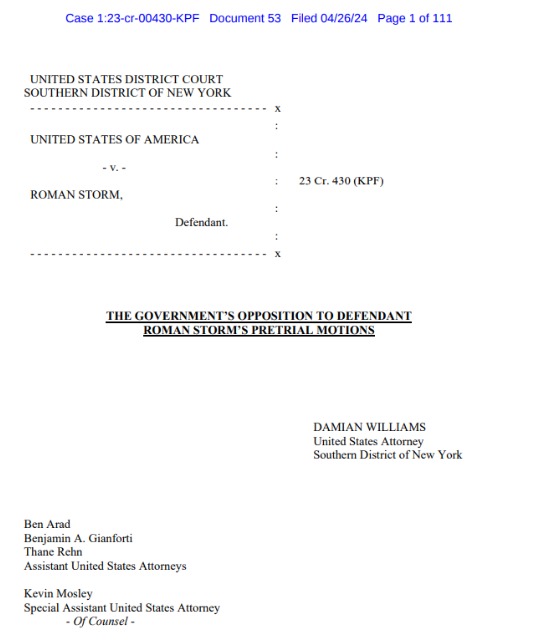According to the petition, the DOJ chastised Tornado Cash’s Co-founders for making insufficient adjustments to exclude sanctioned addresses.
The US Department of Justice (DOJ) has denied a motion to dismiss conspiracy and money laundering charges against Tornado Cash co-founder Roman Storm. The DOJ claims that the filing brought disputed facts for jury deliberation, which is inappropriate for early-stage motions.
The DOJ responded by analyzing why the Tornado Cash co-founder should be held accountable for the alleged offenses. The DOJ disputed the defense’s description of Tornado Cash, stating that it was created in 2019 as a cryptocurrency mixer. The service includes a website, a user interface, intelligent contracts, and a network of “relayers.”
The DOJ accused Roman Storm and another developer, Roman Semenov, of conspiring to commit money laundering, operating an unlicensed money transmitter, and violating sanctions by launching Tornado Cash, a crypto-mixing service. Authorities in the United States believe that entities such as North Korea’s Lazarus Group used Tornado Cash to launder payments.

Storm pleaded not guilty to all allegations in September 2023 and was released on a $2 million bond shortly after being arrested. He is primarily barred from leaving specific areas of New York, New Jersey, Washington, and California.
Storm’s attorneys, however, attempted to dismiss the indictment in late March, claiming that officials lacked probable cause to accuse him. Semenov stressed that while contributing to code design, he was not responsible for its use.
His legal team’s move to dismiss underlined that Tornado Cash is not a custodial mixing service and does not fulfill the definition of a “financial institution.” They claimed Storm had no control over the service, preventing entities like the Lazarus Group from using it.
A team of prosecutors led by Damian Williams alleged in the filing that Storm was responsible for operating the cryptocurrency mixer and accused him of designing mechanisms that helped criminals operate anonymously. They accused Tornado Cash’s co-founders of making insufficient adjustments to eliminate sanctioned addresses.

This comes as the US government continues to crack down on cryptocurrency-mixing services.
On April 24, the co-founders of Samourai Wallet, a cryptocurrency mixer, were arrested and charged with conspiracy to commit money laundering, which carries a maximum sentence of 20 years, and conspiracy to operate an unlicensed money transmitting business, which carries a maximum penalty of five years.
In response to the recent arrest of Samourai Wallet’s founders, Ki Young Ju, CEO of CryptoQuant, they argued that cryptocurrency mixing services are not inherently unlawful.



